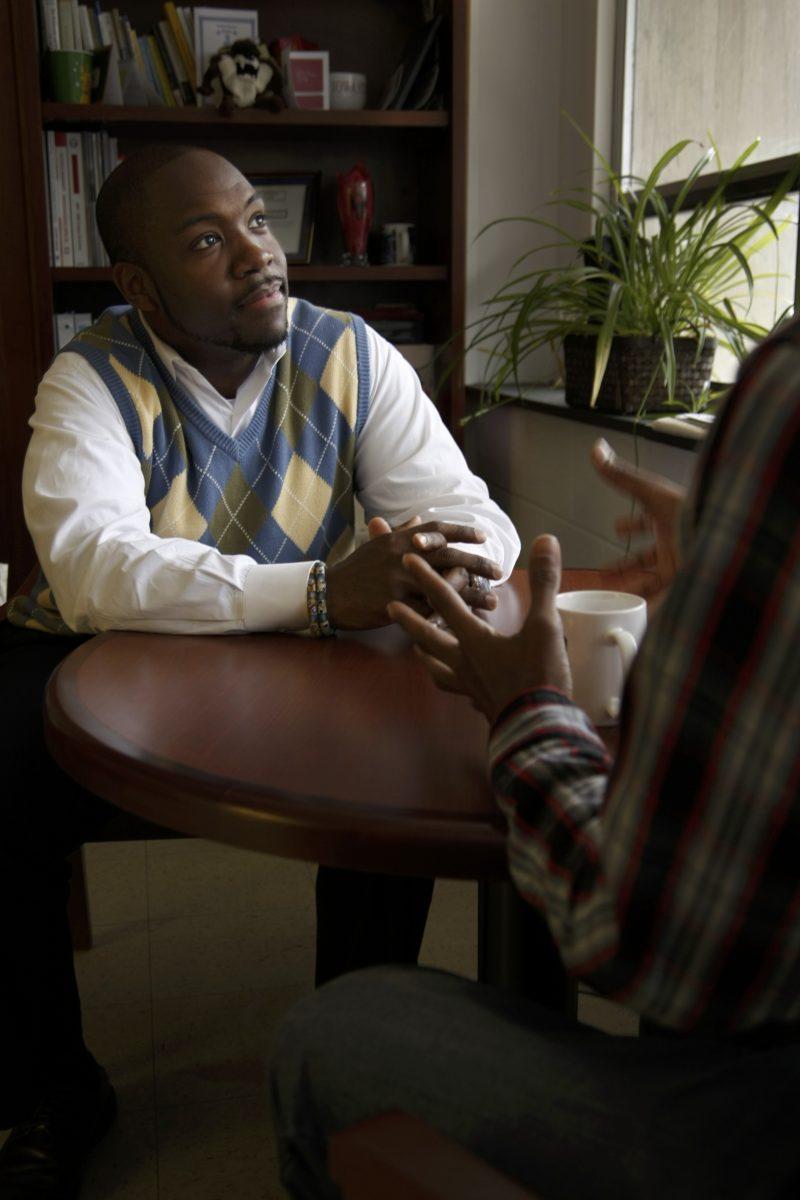
© NCSU Student Media 2009
Thomas Easley, the Director of Community Diversity in the College Of Natural Resources, poses for an environmental portrait Wednesday, March 25, 2009.
Rapper and educator. Normally, a person would think these terms would be mutually exclusive. That is until said person met Thomas Easley.
Easley is the director of community diversity in the College of Natural Resources, and is also a doctoral student in adult and community college education. He has also been rapping for the past 14 years.
Easley began rapping after his grandma passed away when he was 14.
“I was raised by my grandma, and I found a way to get things out through rap,” Easley said.
At first, rapping was just for fun. His raps were more like short stories, and centered on Easley’s feelings. During high school, Easley got together with a rap crew, which made him focus more on how things were said in his raps.
Though he stopped rapping with his crew from high school when he graduated, Easley picked up rapping again when he went to college. Easley also began performing onstage during his junior year.
“It’s one thing to rap in writing, but another thing to rap onstage and entertain everyone,” Easley said.
While in graduate school at Iowa State University, Easley began to perform at open-mic poetry nights. When the popularity of his poems rose, a band asked if they could collaborate with him. Easley then spent 2000-2002 performing with the band as they toured throughout the Midwest, playing in cities such as Chicago and Minneapolis.
After finishing at Iowa State, Easley went back to his hometown of Birmingham, Alabama, and then got his current job at N.C. State. He also stopped rapping.
“I already felt that I was a rapper and a musician. If being famous was the only goal, then I didn’t want to do it,” Easley said.
In the fall of 2007, Easley took a doctoral class on race and gender, where he had an assignment to use an art form to tell a story. Easley said he tried to write a paper, but that it did not seem natural, so he began writing songs. For his presentation, Easley procured his own music and performed the entire piece in front of his class. At the end of his presentation, the class cried and clapped.
“It was then that I realized that I was not done rapping yet,” Easley said.
With his interest reignited, Easley then started a band with students from the College of Natural Resources. He also advised a student group, and while taking some of the students to a conference, met Marquette Branch.
“Marquette had brought music and he played it, while I rapped, just free-styling and going to whatever was playing,” Easley said.
When the conference was over, Easley and Branch decided to record a few songs together. Over time, they made more songs and eventually decided to record an album together.
“I didn’t hear any hip-hop that I wanted to hear, so I made what I wanted to hear,” Easley said.
All of the songs have very positive messages and Easley said he believes people will respect and embrace them.
Easley became an ordained deacon at Poplar Springs Christian church in November 2006. Easley said he never had a desire to become a deacon, but he felt he was called to it.
“Being a deacon helps me remain humble. I see myself as being called upon to impart knowledge to people,” Easley said.
Becoming a deacon has also become a platform for Easley’s rapping. After talking with youth at his church about rap, Easley was asked to perform while out ministering in underprivileged neighborhoods. For the first performance, he was surprised at how many people came in off the street to listen to him. This convinced Easley to perform in his church.
“It blew me away that they liked it,” Easley said.
Easley and Branch have also performed at other churches. Their main goal is to reach out to people.
“People need to be spoken to in the way that they understand. Hip-hop is one of those ways,” Easley said.
In addition to his projects with Branch, Easley also finds time to do some solo projects on the side. These projects are more artistic than commercial, and focus more on Easley’s past experiences.
Easley also has a preference for what he wears when he is performing onstage.
“I like rapping in plain clothes because I feel like I’m a regular guy. I’d rather rap about what I know,” Easley said.
Easley said he is a whole different person when he is performing onstage. He manages to separate himself from his onstage persona by going by his middle name, Rashad, onstage.
Easley feels that being a deacon has helped him become more aware of his behavior.
“I don’t want anyone to see the deacon acting up, and I don’t want to compromise what I do here at the University,” Easley said.
For his work Easley has gotten inspiration from everyday life lessons, as well as President Barack Obama.
The song “Yes We Can” contains snippets of one of Obama’s speeches. Easley wrote it because he wanted to rap about current events, and the song was recorded in October 2008.
“We wanted to pay respect to someone who was represented what they had to say,” Easley said.
Easley said the song is also a motivational song, advocating for better educational systems.
Easley said he plans to send the song to Obama.
“He’ll need a song for re-election,” Easley said.